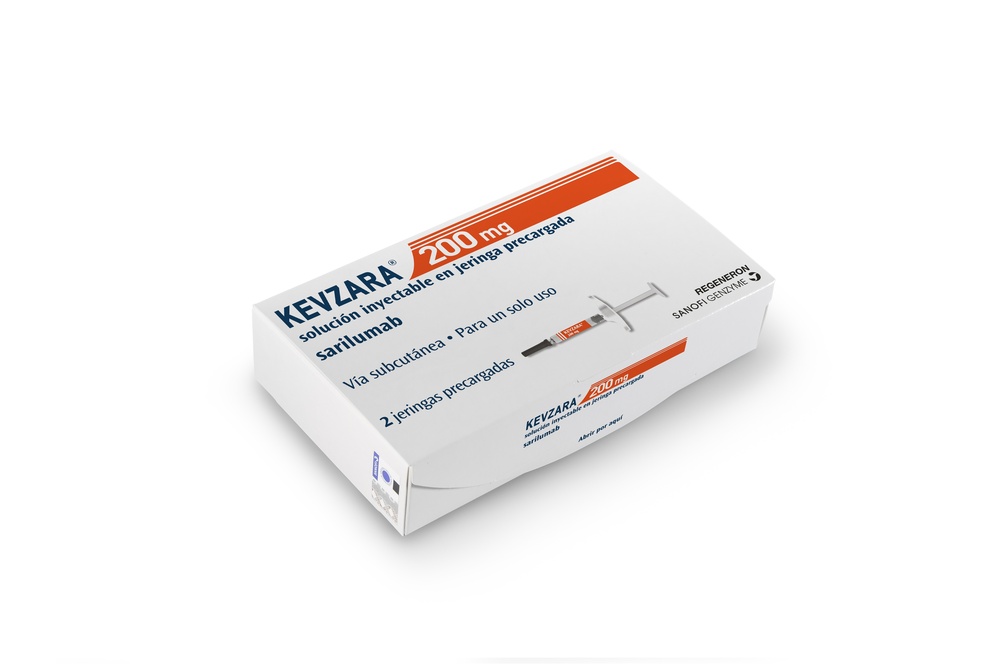
Como usar KEVZARA 200 mg SOLUÇÃO INJETÁVEL EM SERINGA PREENCHIDA
Introdução
Prospecto: informação para o paciente
Kevzara 150 mg solução injetável em seringa pré-carregada
Kevzara 200 mg solução injetável em seringa pré-carregada
sarilumab
Leia todo o prospecto atentamente antes de começar a usar este medicamento, porque contém informações importantes para si.
- Conserva este prospecto, porque pode ter que voltar a lê-lo.
- Se tiver alguma dúvida, consulte o seu médico, farmacêutico ou enfermeiro.
- Este medicamento foi prescrito apenas para si, e não deve dá-lo a outras pessoas, mesmo que tenham os mesmos sintomas que si, porque pode prejudicá-las.
- Se experimentar efeitos adversos, consulte o seu médico, farmacêutico ou enfermeiro, mesmo que se trate de efeitos adversos que não aparecem neste prospecto. Ver seção 4.
Além deste prospecto, será fornecida uma carta de informação para o paciente, que contém informações de segurança importantes que necessita antes e durante o tratamento com Kevzara.
Conteúdo do prospecto
- O que é Kevzara e para que é utilizado
- O que necessita saber antes de começar a usar Kevzara
- Como usar Kevzara
- Possíveis efeitos adversos
- Conservação de Kevzara
- Conteúdo do envase e informações adicionais
1. O que é Kevzara e para que é utilizado
O que é Kevzara
Kevzara contém o princípio ativo sarilumab. É um tipo de proteína denominada anticorpo monoclonal.
Para que é utilizado Kevzara
Kevzara é utilizado para tratar adultos com artrite reumatoide (AR) ativa de moderada a grave se o tratamento prévio não funcionou bem ou não foi tolerado. Kevzara pode ser utilizado sozinho ou junto com um medicamento denominado metotrexato.
Pode ajudá-lo a:
- frear o dano nas articulações
- melhorar a sua capacidade para realizar atividades diárias.
Kevzara é utilizado para tratar adultos com polimialgia reumática após o uso de corticosteroides e não funcionou bem ou se experimenta uma recaída enquanto diminui a dose de corticosteroides (redução gradual). Kevzara pode ser utilizado sozinho ou junto com um medicamento chamado corticosteroide.
Como funciona Kevzara
- Kevzara se une ao receptor de outra proteína denominada interleucina-6 (IL-6) e bloqueia a sua ação.
- A IL-6 desempenha um papel principal nos sintomas da AR como a dor, a inflamação das articulações, a rigidez pela manhã e a fadiga.
2. O que necessita saber antes de começar a usar Kevzara
Não use Kevzara:
- se é alérgico a sarilumab ou a algum dos outros componentes deste medicamento (incluídos na seção 6).
- se tem uma infecção ativa grave.
Advertências e precauções
Consulte o seu médico, farmacêutico ou enfermeiro se:
- tem alguma infecção ou se contrai infecções frequentemente. Kevzara pode reduzir a capacidade do seu corpo para combater a infecção: isso significa que pode torná-lo mais suscetível a contrair infecções ou a piorar a infecção.
- tem tuberculose (TB), sintomas de TB (tos persistente, perda de peso, desgosto, febre leve), ou esteve em contato próximo com uma pessoa com TB. Antes de iniciar um tratamento com Kevzara, o seu médico fará testes para a TB.
- teve hepatite viral ou outra doença do fígado. Antes de usar Kevzara, o seu médico fará um exame de sangue para rever o funcionamento do seu fígado.
- teve diverticulite (uma doença do cólon) ou úlceras no estômago ou nos intestinos, ou desenvolve sintomas como febre e dor de estômago (dor abdominal) que não desaparece.
- alguma vez teve algum tipo de câncer.
- foi vacinado recentemente ou será vacinado.
Se algum dos pontos anteriores o afeta (ou se não está seguro), consulte o seu médico, farmacêutico ou enfermeiro antes de usar Kevzara.
Deverá fazer exames de sangue antes de receber Kevzara. Também deverá fazer exames durante o tratamento. Isso é para rever se tem um recuento baixo de células sanguíneas, problemas de fígado ou alterações nos seus níveis de colesterol.
Cada vez que receber um novo envase de Kevzara, é importante que anote o nome do medicamento, a data de administração e o número do lote (que aparece no envase após “Lote”) e guarde esta informação em um local seguro.
Crianças e adolescentes
A seringa pré-carregada de Kevzara não foi estudada em crianças a partir de 2 anos de idade com AIJp e não está indicada para uso em crianças.
Não se recomenda o uso de Kevzara em crianças menores de 2 anos de idade. Kevzara não deve ser administrado a crianças com AIJp que pesem menos de 10 kg.
Outros medicamentos e Kevzara
Informa ao seu médico ou farmacêutico se está utilizando, utilizou recentemente ou pode ter que utilizar qualquer outro medicamento. Isso se deve a que Kevzara pode afetar a forma como outros medicamentos atuam. Também outros medicamentos podem afetar a forma como Kevzara atua.
Em particular, não use Kevzara e informe ao seu médico ou farmacêutico se está usando:
- um grupo de medicamentos denominados “inibidores da Janus cinase (JAK)” (utilizados para doenças como a artrite reumatoide e o câncer)
- outros medicamentos biológicos usados no tratamento da AR.
Se algum dos pontos anteriores o afeta (ou se não está seguro), consulte o seu médico ou farmacêutico.
Kevzara pode afetar a forma de atuar de alguns medicamentos: isso significa que pode ser necessário modificar a dose de outros medicamentos. Se está usando algum dos seguintes medicamentos, informe ao seu médico ou farmacêutico antes de usar Kevzara:
- estatinas, usadas para reduzir o nível de colesterol
- anticoncepcionais orais
- teofilina, usada para tratar a asma
- warfarina, usada para prevenir os coágulos de sangue.
Se algum dos pontos anteriores o afeta (ou se não está seguro), consulte o seu médico ou farmacêutico.
Gravidez e amamentação
Fale com o seu médico antes de utilizar Kevzara se está grávida ou em período de amamentação, acredita que possa estar grávida ou tem intenção de engravidar.
- Não use Kevzara se está grávida a não ser que o seu médico o recomende especificamente.
- Desconhece-se os efeitos de Kevzara sobre o feto.
- O seu médico e você devem decidir se você deve receber o tratamento com Kevzara se está amamentando.
Condução e uso de máquinas
Não se espera que o uso de Kevzara afete a sua capacidade para conduzir ou utilizar máquinas. No entanto, se se sentir cansado ou sentir mal-estar após receber o tratamento com Kevzara, não deve conduzir nem utilizar máquinas.
KEVZARA contém polissorbato 20
Este medicamento contém 2,28 mg de polissorbato 20 em cada 1,14 ml de solução injetável equivalente a 2 mg/ml. Os polissorbatos podem causar reações alérgicas. Informe ao seu médico se tem alguma alergia conhecida.
3. Como usar Kevzara
O tratamento deve ser iniciado por um médico com experiência no diagnóstico e tratamento da AR ou polimialgia reumática. Siga exatamente as instruções de administração deste medicamento indicadas pelo seu médico ou farmacêutico. Em caso de dúvida, consulte novamente o seu médico ou farmacêutico.
Pacientes adultos
A dose recomendada é uma injeção de 200 mg cada duas semanas.
- O seu médico pode ajustar a dose do seu medicamento com base nos resultados dos seus exames de sangue.
Kevzara é administrado como uma injeção sob a pele (denominada injeção “subcutânea”).
Aprenda como usar a seringa pré-carregada
- O seu médico, farmacêutico ou enfermeiro lhe ensinará como injetar Kevzara. Seguindo estas instruções, Kevzara pode ser injetado por você mesmo ou administrado por um cuidador após receber uma formação adequada.
- Siga cuidadosamente as “Instruções de Uso” incluídas no envase.
- Use a seringa pré-carregada exatamente como descrito nas “Instruções de Uso”.
Se usar maisKevzarado que deve
Se utilizou mais Kevzara do que deve, informe ao seu médico, farmacêutico ou enfermeiro.
Se esqueceu de usar uma dose deKevzara
Se passaram 3 dias ou menos desde a dose esquecida:
- injete a sua dose esquecida assim que possível.
- então administre a sua próxima dose no próximo dia programado.
Se passaram 4 dias ou mais, injete a próxima dose no próximo dia programado. Não injete uma dose dupla para compensar a injeção esquecida.
Se não tem certeza de quando deve injetar a sua próxima dose, pergunte ao seu médico, farmacêutico ou enfermeiro para que lhe dêem instruções.
Se interromper o tratamento comKevzara
Não interrompa o tratamento com Kevzara sem comentar com o seu médico.
Se tiver alguma outra dúvida sobre o uso deste medicamento, pergunte ao seu médico, farmacêutico ou enfermeiro.
4. Possíveis efeitos adversos
Como todos os medicamentos, este medicamento pode produzir efeitos adversos, embora nem todas as pessoas os sofram.
Efeito adverso grave
Informe ao seu médicoimediatamentese acha que tem uma infecção(que pode afetar até 1 de cada 10 pessoas). Os sintomas podem incluir febre, suores ou calafrios.
Outros efeitos adversos
Informe ao seu médico, farmacêutico ou enfermeiro se observa algum dos seguintes efeitos adversos:
Adultos
Muito frequentes(podem afetar mais de 1 de cada 10 pessoas)
- Recuentos baixos de células brancas do sangue de acordo com os exames de sangue
Frequentes(podem afetar até 1 de cada 10 pessoas)
- infecções nos seios nasais ou na garganta, congestão ou gotejamento nasal e dor de garganta (infecção do trato respiratório superior)
- infecção do trato urinário
- herpes febril (herpes oral)
- recuentos baixos de plaquetas de acordo com os exames de sangue
- colesterol alto, triglicéridos altos de acordo com os exames de sangue
- provas anormais da função hepática
- reações no local da injeção (incluindo vermelhidão e picazão)
- inflamação do tecido profundo da pele
- infecção dos pulmões
Pouco frequentes(podem afetar até 1 de cada 100 pessoas)
- diverticulite (uma doença que afeta o intestino, frequentemente com dor de estômago (abdominal), náusea e vômito, febre e estreitamento, ou menos frequentemente diarreia)
Raros(podem afetar até 1 de cada 1 000 pessoas)
- perfuração no estômago ou intestinos (um orifício que se desenvolve na parede do intestino)
Comunicação de efeitos adversos
Se experimentar qualquer tipo de efeito adverso, consulte o seu médico, farmacêutico ou enfermeiro, mesmo que se trate de possíveis efeitos adversos que não aparecem neste prospecto. Também pode comunicá-los diretamente através do sistema nacional de notificação incluído no Apêndice V*. Mediante a comunicação de efeitos adversos, você pode contribuir para fornecer mais informações sobre a segurança deste medicamento.
5. Conservação de Kevzara
Mantenha este medicamento fora da vista e do alcance das crianças.
Não utilize este medicamento após a data de validade que aparece na etiqueta e no envase após CAD. A data de validade é o último dia do mês que se indica.
Conservar na geladeira (entre 2 °C e 8 °C).
- Não congelar.
- Uma vez fora da geladeira, não conservar Kevzara a temperatura superior a 25 ºC.
- Escriba a data em que retira a seringa da geladeira no espaço fornecido no envase exterior.
- Use a seringa nos 14 dias seguintes a retirá-la da geladeira ou da bolsa isotérmica.
- Mantenha a seringa no envase original para proteger da luz.
Não utilize este medicamento se a solução na seringa está turva, descolorada ou contém partículas, ou se alguma parte da seringa pré-carregada parece danificada.
Após usar, coloque a seringa em um contenedor para objetos pontiagudos. Mantenha sempre o contenedor fora da vista e do alcance das crianças. Pergunte ao seu médico, farmacêutico ou enfermeiro como se livrar do contenedor.
Os medicamentos não devem ser jogados nos esgotos nem na lixeira. Pergunte ao seu farmacêutico como se livrar dos medicamentos que já não precisa. Dessa forma, ajudará a proteger o meio ambiente.
6. Conteúdo do envase e informação adicional
Composição de Kevzara
- O princípio ativo é sarilumab. Cada seringa precarregada contém 150 mg ou 200 mg de sarilumab em 1,14 ml de solução.
- Os demais excipientes são arginina, histidina, polissorbato 20 (E 432), sacarose e água para preparações injetáveis.
Aspecto do produto e conteúdo do envase
Kevzara é uma solução injetável transparente, incolor a cor amarela pálida, que se apresenta em uma seringa precarregada.
Cada seringa precarregada contém 1,14 ml de solução que proporciona uma única dose. Kevzara está disponível em envases que contêm 1 ou 2 seringas precarregadas e envases múltiplos que contêm 3 envases, cada um com 2 seringas precarregadas.
Pode ser que apenas alguns tamanhos de envases sejam comercializados.
Kevzara está disponível como seringas precarregadas de 150 mg ou 200 mg.
Titular da autorização de comercialização
Sanofi Winthrop Industrie
82 avenue Raspail
94250 Gentilly
França
Responsável pela fabricação
Sanofi Winthrop Industrie
1051 Boulevard Industriel
76580 Le Trait,
França
Pode solicitar mais informações sobre este medicamento dirigindo-se ao representante local do titular da autorização de comercialização:
Bélgica Sanofi Belgium Tel: +32 (0)2 710 54 00 | Lituânia Swixx Biopharma UAB Tel: +370 5 236 91 40 |
| Luxemburgo Sanofi Belgium Tel: +32 (0)2 710 54 00 (Bélgica) |
República Tcheca Sanofi s.r.o. Tel: +420 233 086 111 | Hungria SANOFI-AVENTIS Zrt. Tel.: +36 1 505 0050 |
Dinamarca Sanofi A/S Tlf: +45 45 16 70 00 | Malta Sanofi S.r.l. +39. 02 39394275 |
Alemanha Sanofi-Aventis Deutschland GmbH Telefone: 0800 04 36 996 Telefone do exterior: +49 69 305 70 13 | Países Baixos Sanofi B.V. Tel: +31 20 245 4000 |
Estônia Swixx Biopharma OÜ Tel: +372 640 10 30 | Noruega sanofi-aventis Norge AS Tlf: +47 67 10 71 00 |
Grécia Sanofi-Aventis Μονοπρ?σωπη AEBE Τηλ: +30 210 900 16 00 | Áustria sanofi-aventis GmbH Tel: +43 1 80 185 – 0 |
Espanha sanofi-aventis, S.A. Tel: +34 93 485 94 00 | Polônia Sanofi Sp. z o.o. Tel.: +48 22 280 00 00 |
França Sanofi Winthrop Industrie Tél: 0 800 222 555 Chamada do exterior: +33 1 57 63 23 23 | Portugal Sanofi - Produtos Farmacêuticos, Lda Tel: +351 21 35 89 400 |
Croácia Swixx Biopharma d.o.o. Tel: +385 1 2078 500 | Romênia Sanofi Romania SRL Tel: +40 (0) 21 317 31 36 |
Irlanda sanofi-aventis Ireland Ltd. T/A SANOFI Tel: +353 (0) 1 403 56 00 | Eslovênia Swixx Biopharma d.o.o. Tel: +386 1 235 51 00 |
Islândia Vistor ehf. Sími: +354 535 7000 | República Eslovaca Swixx Biopharma s.r.o. Tel: +421 2 208 33 600 |
Itália Sanofi S.r.l. Tel: 800 536389 | Finlândia Sanofi Oy Puh/Tel: +358 (0) 201 200 300 |
Chipre C.A. Papaellinas Ltd. Τηλ: +357 22 741741 | Suécia Sanofi AB Tel: +46 (0)8 634 50 00 |
Letônia Swixx Biopharma SIA Tel: +371 6 616 47 50 |
Data da última revisão deste prospecto:
A informação detalhada deste medicamento está disponível no site da Agência Europeia de Medicamentos: http://www.ema.europa.eu.
--------------------------------------------------------------------------------------------------------------------
Kevzara 200 mg solução injetável em seringa precarregada
sarilumab
Instruções de uso
As partes da seringa precarregada de Kevzara são mostradas neste desenho.
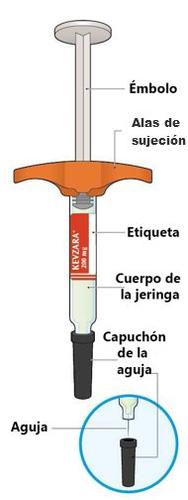
Informação importante
Este dispositivo é uma seringa precarregada de dose única (denominada “seringa” nestas instruções). Contém 200 mg de Kevzara para injeção por baixo da pele (injeção subcutânea) uma vez a cada duas semanas.
Solicite ao seu profissional de saúde que lhe mostre como usar corretamente a seringa antes da sua primeira injeção.
O que deve fazer
- Leia todas as instruções atentamente antes de usar uma seringa.
- Verifique se tem o medicamento correto e a dose correta.
- Guarde as seringas não usadas no envase original e conserve-as na geladeira a uma temperatura entre 2 °C e 8 °C.
- Guarde o envase em uma bolsa isotérmica com um acumulador de frio quando viajar.
- Deixe a seringa atingir a temperatura ambiente durante pelo menos 30 minutos antes de usá-la.
- Use a seringa dentro de um prazo de 14 dias após retirá-la da geladeira ou da bolsa isotérmica.
- Mantenha a seringa fora da vista e do alcance das crianças.
O que não deve fazer
- Não use a seringa se ela sofreu danos ou se falta o capuchão da agulha ou não está sujeito.
- Não retire o capuchão da agulha até que não esteja preparado para a injeção.
- Não toque a agulha.
- Não tente recolocar o capuchão na seringa.
- Não reutilize a seringa.
- Não congele nem aqueça a seringa.
- Uma vez retirada da geladeira, não conserve a seringa a temperatura superior a 25 °C.
- Não exponha a seringa à luz solar direta.
- Não injete através da roupa.
Se tiver alguma pergunta adicional, consulte seu médico, farmacêutico ou enfermeiro.
Passo A: Preparação para a injeção
- Prepare todo o equipamento que vai precisar em uma zona limpa e plana.
- Precisará de uma toalhita com álcool, uma bola de algodão ou gaze, e um contenedor para objetos pontiagudos.
- Retire uma seringa do envase segurando-a pelo meio do corpo da seringa. Guarde a seringa restante no envase na geladeira.
- Olhe a etiqueta.
- Verifique se tem o medicamento correto e a dose correta.
- Verifique a data de validade (CAD).
- Nãouse a seringa se estiver vencida.
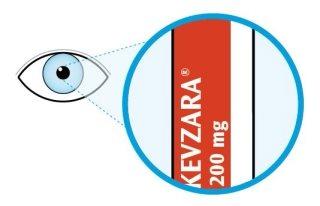
- Olhe o medicamento.
- Verifique se o líquido é transparente e incolor a cor amarela pálida.
- Pode ver uma bolha de ar, isso é normal.
- Nãoproceda com a injeção se o líquido estiver turvo, descolorido ou contiver partículas.
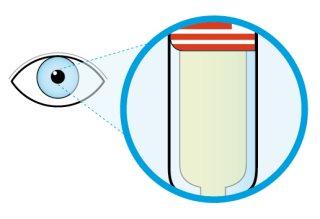
- Coloque a seringa sobre uma zona plana e deixe que atinja a temperatura ambiente (<25 ºC) durante pelo menos 30 minutos.
- Usar a seringa a temperatura ambiente pode tornar a injeção mais confortável.
- Nãouse a seringa se ela estiver fora da geladeira por mais de 14 dias.
- Nãoaqueça a seringa; deixe que se atempere naturalmente.
- Nãoexponha a seringa à luz solar direta.
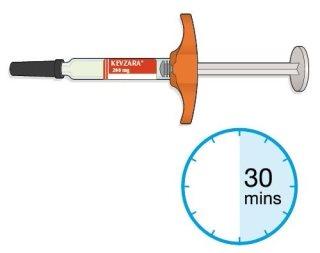
- Selecione o local da injeção.
- Pode injetar em sua coxa ou abdômen (exceto nos 5 cm ao redor do umbigo). Se alguém lhe der a injeção, também pode escolher a parte exterior e superior do braço.
- Alterne o local da injeção cada vez que se injetar.
- Nãofaça a injeção na pele sensível, danificada ou com hematomas ou cicatrizes.
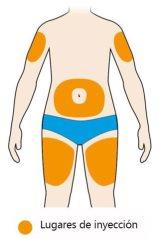
- Prepare o local da injeção.
- Lave as mãos.
- Desinfete a pele com uma toalhita com álcool.
- Nãotoque o local da injeção antes da injeção.
Passo B: Realize a injeção - Prossiga com o Passo B apenas após completar o Passo A “Preparação para a injeção”
- Retire o capuchão da agulha.
- Segure a seringa pelo meio do corpo da seringa apontando com a agulha em direção contrária a você.
- Mantenha sua mão fora do êmbolo.
- Nãoelimine as bolhas de ar na seringa.
- Nãoretire o capuchão até que esteja preparado para a injeção.
- Nãorecoloque o capuchão da agulha.
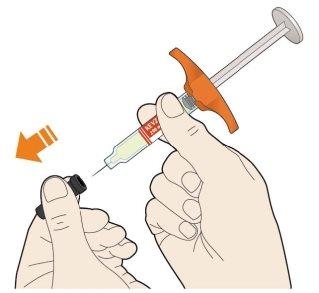
- Pegue a pele.
- Use o polegar e o dedo indicador para pegar um dobra da pele no local da injeção.
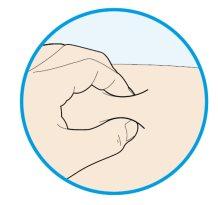
- Insira a agulha no dobra da pele em um ângulo de aproximadamente 45°.
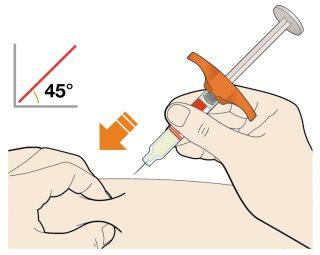
- Empurre o êmbolo para baixo.
- Empurre o êmbolo lentamente até que se detenha e a seringa esteja vazia.
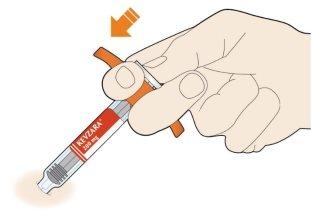
- Antes de retirar a agulha, verifique se a seringa está vazia.
- Retire a agulha com o mesmo ângulo com que se realizou a injeção.
- Se vir algo de sangue, pressione no local da injeção com uma bola de algodão ou gaze.
- Nãose esfregue a pele após a injeção.
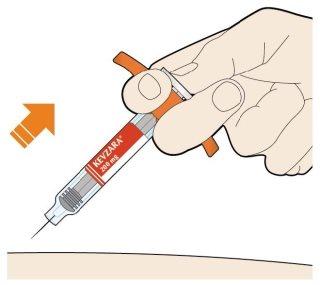
- Coloque a seringa usada e o capuchão em um contenedor para objetos pontiagudos de forma imediata após o uso.
- Mantenha sempre o contenedor fora da vista e do alcance das crianças.
- Nãorecoloque o capuchão da agulha.
- Nãojogue a seringa usada no lixo.
- Nãojogue o contenedor para objetos pontiagudos usado no lixo, a menos que a regulamentação local permita. Pergunte ao seu médico, farmacêutico ou enfermeiro como se livrar do contenedor.
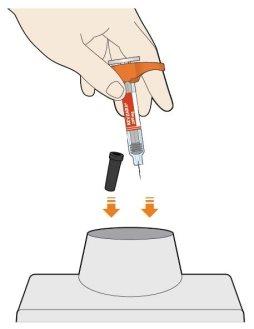
- País de registo
- Substância ativa
- Requer receita médicaSim
- Fabricante
- Esta informação é apenas para referência e não constitui aconselhamento médico. Consulte sempre um médico antes de tomar qualquer medicamento. A Oladoctor não se responsabiliza por decisões médicas baseadas neste conteúdo.
- Alternativas a KEVZARA 200 mg SOLUÇÃO INJETÁVEL EM SERINGA PREENCHIDAForma farmacêutica: INJETÁVEL, 150 mgSubstância ativa: sarilumabFabricante: Sanofi Winthrop IndustrieRequer receita médicaForma farmacêutica: INJETÁVEL, 150 mgSubstância ativa: sarilumabFabricante: Sanofi Winthrop IndustrieRequer receita médicaForma farmacêutica: INJETÁVEL, 200 mgSubstância ativa: sarilumabFabricante: Sanofi Winthrop IndustrieRequer receita médica
Médicos online para KEVZARA 200 mg SOLUÇÃO INJETÁVEL EM SERINGA PREENCHIDA
Avaliação de posologia, efeitos secundários, interações, contraindicações e renovação da receita de KEVZARA 200 mg SOLUÇÃO INJETÁVEL EM SERINGA PREENCHIDA – sujeita a avaliação médica e regras locais.



